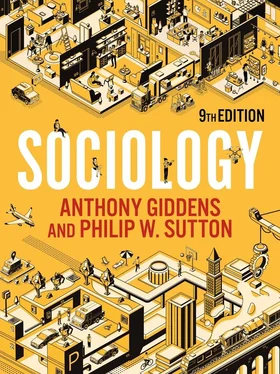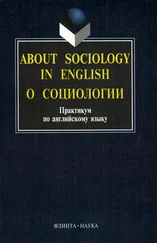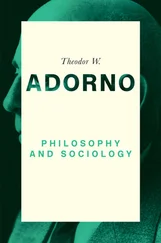While classical sociology was marked by quite formal theoretical systems that looked rather like paradigms, less formal contemporary theories are much looser, rooted in representations of social reality through new concepts such as globalization, risk, postmodernism, reflexive modernization, habitus, liquid modernity, high modernity and even multiple modernities. Outhwaite (2015: 614) describes much of this work as ‘celebrity social theory’, in the sense that the theoretical perspectives are relatively weak (compared to older, formal theories) while the theorists themselves enjoy widespread recognition. For example, students today would easily recognize the names of Anthony Giddens, Ulrich Beck, Judith Butler, Michel Foucault, Pierre Bourdieu and Zygmunt Bauman.
Table 3.1provides a simple chronological chart which illustrates the emergence and development of theories and perspectives through certain influential theorists and schools of thought. The place of individuals in the sequence is determined roughly by the date of their major publication(s) or the place of schools by their date of formation. This is of course merely a selection and is not meant to be exhaustive, but the table provides some signposts both for this chapter and for the book as a whole.
Table 3.1 Chronology of major sociological theorists and schools, 1750 to the present
| 1750 |
European Enlightenment philosophers (1750–1800) |
| 1800 |
Auguste Comte (1798–1857) Harriet Martineau (1802–76) |
| 1850 |
Karl Marx (1818–83) Herbert Spencer (1820–1903) |
| 1900 |
Emile Durkheim (1858–1917) |
|
Max Weber (1864–1920) |
|
Georg Simmel (1858–1918) Edmund Husserl (1859–1938) |
| 1930 |
George H. Mead (1863–1931) Alfred Schutz (1899–1959) |
|
Chicago School (1920s) Antonio Gramsci (1891–1937) |
|
W. E. B. Du Bois (1868–1963) |
| 1940 |
Talcott Parsons (1902–79) |
|
Frankfurt School (1923–1960s) |
|
Simone de Beauvoir (1908–86) |
| 1950 |
Robert Merton (1910–2003) |
| 1960 |
Erving Goffman (1922–82) |
|
Betty Friedan (1921–2006) |
|
Howard Becker (1928– )Harold Garfinkel (1917–2011) Norbert Elias (1897–1990) |
| 1970 |
Jürgen Habermas (1929– ) |
|
Michel Foucault (1926–84) |
| 1980 |
Pierre Bourdieu (1930–2002) Immanuel Wallerstein (1930–2019) |
|
Jean Baudrillard (1929–2007) |
| 1990 |
Anthony Giddens (1938– ) Ulrich Beck (1944–2015) Judith Butler (1956– ) |
|
Vandana Shiva (1952– ) Zygmunt Bauman (1925–2017) |
| 2000 onwards |
Manuel Castells (1942– ) Slavoj Žižek (1949– ) |
Key:Selected theorists associated with or inspired by the different sociological perspectives are identified thus: ■ Philosophical thinkers ■ Functionalism ■ Marxism ■ Interactionism ■ Feminism ■ Postmodernism/poststructuralism ■ Theoretical syntheses
A distinct sociological perspective emerged out of two revolutionary transformations in Europe. First, the Industrial Revolution of the late eighteenth and the nineteenth century radically transformed material conditions of life and work, bringing with it new social problems such as urban overcrowding, poor sanitation, disease and industrial pollution. Reformers sought ways to mitigate and solve these problems, which led them to carry out research and gather evidence on their extent and nature to reinforce the case for change.
Second, the French Revolution of 1789 marked the symbolic endpoint of the old European agrarian regimes and absolute monarchies as new republican ideals of freedom, liberty and citizenship rights came to the fore. This revolution is often seen as, in part, the outcome of mid-eighteenth-century European Enlightenment ideas, which challenged tradition and religious authority, promoting philosophical and scientific notions of reason, rationality and critical thinking as the keys to human progress. These revolutionary developments are often seen as instituting a process of European modernization that led to modernity, a term that refers to an era characterized by a combination of rationalization, democratization, individualism, growing reliance on scientific thinking and rapid, continuous technological development. In this sense, sociology was a ‘modern’ discipline that developed to try and understand how such radical social change had occurred and what its consequences were.
Enlightenment philosophers saw the advancement of reliable knowledge in the natural sciences, particularly astronomy, physics and chemistry, as showing the way forward. The English physicist Sir Isaac Newton (1643–1727) was singled out as an exemplary scientist whose ideas of Natural Law and scientific method appealed to Enlightenment scholars. The latter argued that, in principle, it should be possible to discover similar laws, using similar methods, in social and political life as well. This idea is the basis of positivist philosophy in the sciences.
How is the concept of modernity faring in the twenty-first century? List some examples which suggest that we are more aware that there is also a ‘dark side’ to scientific knowledge, industrial processes and technological change.
Positivism and ‘social evolution’
Auguste Comte (1798–1857) saw the science of society – which he termed ‘sociology’ – as essentially similar to the natural sciences. His positivist approach was based on the principle of direct observation, with theoretical statements aimed at establishing causal, law-like generalizations. The task of sociology was to gain reliable knowledge of the social world in order to make predictions about it and, on the basis of those predictions, to intervene and shape it in progressive ways. Comte’s positivist philosophy was clearly inspired by the achievements of the natural sciences, which were producing reliable knowledge with very practical applications.

But could such reliable, predictive knowledge ever be achieved in relation to human behaviour? Most sociologists today think it cannot, and very few would call themselves ‘positivist’ in Comte’s sense. Comtean positivism is rejected because it seems to suggest that people can be shaped and controlled, a notion that many view as impossible, dangerous or both. Self-conscious human beings cannot be studied in the same way as, say, frogs, because they are capable of acting in ways that deliberately confound our predictions about them. Even if Comte was right and humans could be scientifically studied, their behaviour forecast and positive interventions made, who would do the intervening? Scientists? Politicians? Religious authorities? Would central direction of this kind be compatible with democratic politics?

Читать дальше














